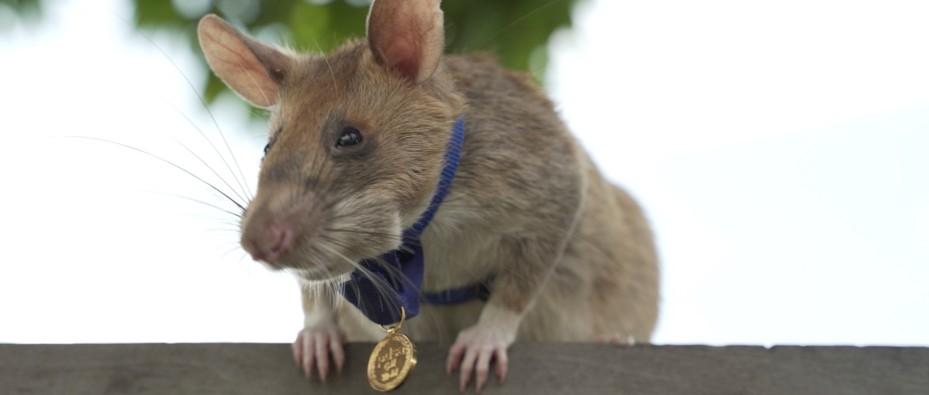Meet Magawa, the first rat to ever be awarded a PDSA gold medal. The five-year-old African giant pouched rat has found 39 landmines and 28 other potentially dangerous items of unexploded ordnance over the past four years, sniffing his way across 140,000 square metres of land – the equivalent of 20 football pitches.
The PDSA gold medal was launched in 2002, awarding bravery and devotion to duty for non-military animals, and is said to be the animal equivalent of the George Cross.
He was born in Tanzania in November 2014 and completed nine months’ of training at APOPO’s HeroRAT Training and Research Center in Tanzania, where he learned how to detect the smell of explosives using his nose. He was then sent off to Siem Reap in Cambodia to get to work sniffing out landmines.
“APOPO’s HeroRATs significantly speed up landmine detection, using their amazing sense of smell and excellent memory. We use clicker training to teach rats like Magawa to scratch at the ground above a landmine. During training they hear a ‘click’ and receive a tasty food reward for finding the correct target scent,” said CEO of APOPO Christophe Cox.
Read more about amazing animals:
- Relative to body size, Saharan silver ants sprint 20x faster than Usain Bolt
- Crabs can remember the route through a complex maze
- Weird science: six unusual studies on our favourite livestock
“Unlike metal detectors, the rats ignore scrap metal and only sniff out explosives, making them fast and efficient landmine detectors. This not only saves lives but returns much-needed safe land back to the communities as quickly and cost-effectively as possible. This in turn will allow the families living around the minefields to improve their livelihoods and get their lives back on track.”
Cambodia estimates that between four and six million landmines were laid in the country during the bitter conflict that raged in the country in the 1970s and 1980s. To date, they have been responsible for more than 64,000 casualties.
Reader Q&A: Where do smells go?
Asked by: Martin Ogilvie, Norwich
Smells ‘disappear’ when the aroma molecules disperse in the air to a concentration below your detection threshold. Your nose is more sensitive to some compounds than others: the eggy smell of hydrogen sulphide is detectable at concentrations of two parts per billion, while nail varnish remover (acetone) needs to be 50,000 times more concentrated before you can smell it. Some aroma molecules may also chemically react in the air to form a different compound that you are less sensitive to.
Read more:
Source: Adorable landmine-detecting rat awarded tiny medal for bravery – BBC Science Focus Magazine













